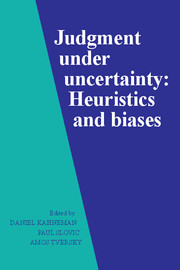Book contents
- Frontmatter
- Contents
- List of contributors
- Preface
- Part I Introduction
- Part II Representativeness
- Part III Causality and attribution
- Part IV Availability
- 11 Availability: A heuristic for judging frequency and probability
- 12 Egocentric biases in availability and attribution
- 13 The availability bias in social perception and interaction
- 14 The simulation heuristic
- Part V Covariation and control
- Part VI Overconfidence
- Part VII Multistage evaluation
- Part VIII Corrective procedures
- Part IX Risk perception
- Part X Postscript
- References
- Index
12 - Egocentric biases in availability and attribution
Published online by Cambridge University Press: 05 May 2013
- Frontmatter
- Contents
- List of contributors
- Preface
- Part I Introduction
- Part II Representativeness
- Part III Causality and attribution
- Part IV Availability
- 11 Availability: A heuristic for judging frequency and probability
- 12 Egocentric biases in availability and attribution
- 13 The availability bias in social perception and interaction
- 14 The simulation heuristic
- Part V Covariation and control
- Part VI Overconfidence
- Part VII Multistage evaluation
- Part VIII Corrective procedures
- Part IX Risk perception
- Part X Postscript
- References
- Index
Summary
One instance of a phenomenon examined in the present experiments is familiar to almost anyone who has conducted joint research. Consider the following: You have worked on a research project with another person, and the question arises as to who should be “first author” (i.e., who contributed more to the final product?). Often, it seems that both of you feel entirely justified in claiming that honor. Moreover, since you are convinced that your view of reality must be shared by your colleague (there being only one reality), you assume that the other person is attempting to take advantage of you. Sometimes such concerns are settled or prevented by the use of arbitrary decision rules, for example, the rule of “alphabetical priority” – a favorite gambit of those whose surnames begin with letters in the first part of the alphabet.
We suggest, then, that individuals tend to accept more responsibility for a joint product than other contributors attribute to them. It is further proposed that this is a pervasive phenomenon when responsibility for a joint venture is allocated by the participants. In many common endeavors, however, the participants are unaware of their divergent views, since there is no need to assign “authorship”; consequently, the ubiquity of the phenomenon is not readily apparent. The purpose of the current research was to assess whether these egocentric perceptions do occur in a variety of settings and to examine associated psychological processes.
Information
- Type
- Chapter
- Information
- Judgment under UncertaintyHeuristics and Biases, pp. 179 - 189Publisher: Cambridge University PressPrint publication year: 1982
Accessibility standard: Unknown
Why this information is here
This section outlines the accessibility features of this content - including support for screen readers, full keyboard navigation and high-contrast display options. This may not be relevant for you.Accessibility Information
- 9
- Cited by
